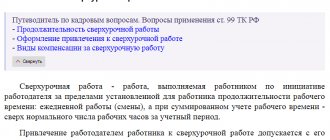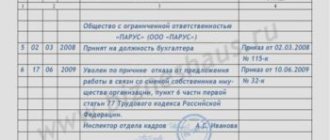Which employees should not be laid off?
According to current Russian legislation, there are categories of employees who, under no circumstances, can be dismissed from their jobs due to layoffs. There are not so many of them, and these restrictions mainly concern women, in particular motherhood.
The following categories of employees cannot be dismissed due to reduction:
- single mothers with children under 14 years of age or disabled children under 18 years of age;
- women expecting a child (pregnant);
- women who have children under three years of age;
- other persons raising children of these age categories without mothers;
- underage workers;
- elected members of trade unions.
At the same time, pregnant women and minor workers can be fired without their consent only in the event of complete liquidation of the enterprise. In other cases, dismissal is possible if the employee’s guilt in relation to the enterprise is proven. In particular, violation of labor regulations.
In addition, according to the law, it is impossible to dismiss from work temporarily disabled people during illness, confirmed by a sick leave certificate, and those who were sent on leave, including maternity and parental leave.
Note! In the era of coronavirus, everyone is looking for additional opportunities to earn money. It’s surprising that you can earn much more using alternative methods, up to millions of rubles a month. One of our best authors wrote an excellent article about how thousands of people make money in the gaming industry on the Internet. Read the article with reviews about making money on games in the best establishments.
How not to fire employees
One of the measures to support business during the pandemic was the suspension of scheduled inspections. But unscheduled inspections will be carried out based on employees’ requests to the labor inspectorate.
“In the field of personnel records management, we are now in the period of creating a mass of new documents and reports in connection with the pandemic, so it will be difficult to pass any audit 100%,” warns HR Director of the VseInstrumenty.ru project Alesya Rakitina. — During the pandemic, the state has a focus on protecting the interests of workers in order to preserve jobs. This is also definitely worth taking into account.”
We asked experts to share the most common employer violations. The result was 10 anti-tips from the series “how not to fire employees.”
Dismissal without cause - just like that
This is the most common mistake in an employer’s actions, according to Rostrud. It arises if dismissal is made without sufficient reasons or the employer’s actions do not comply with the legally established procedure for dismissal.
One example is that an employee is not notified of the upcoming dismissal within the period established by law, but is notified unexpectedly because they decided to “compact” the staff and thus save on the wage fund.
During the spread of coronavirus, layoffs have taken on special proportions. Some employers used clause 7, part 1, art. as a basis for terminating employment relations. 83 of the Labor Code of the Russian Federation - the occurrence of emergency circumstances that prevent the continuation of labor relations. But, for example, at the end of May, it was in precisely this case that an ex-employee of Avia LLC was reinstated at work.
Rostrud provides on its website real examples of violations when employers notify an employee of an upcoming dismissal by telephone, which is unacceptable in principle.
To learn about the legal grounds for dismissal, read the article “Dismissal of an employee: 7 grounds for terminating an employment contract.”
Dismissal if the company has no profit
This is another illegal reason that can be used during an economic crisis. Rostrud directly states that “lack of profit is not an independent basis for dismissing workers.”
Labor inspectors have repeatedly reminded that dismissal by law is possible only for the following reasons: an employee grossly violates discipline, the company is in the process of liquidation, staffing changes, etc. (the full list is indicated in Part 1 of Article 81 of the Labor Code of the Russian Federation).
Dismissal based on email
Dismissal at the initiative of an employee does not provide for the use of electronic document management, since the resignation letter must be drawn up in writing (Article 80 of the Labor Code of the Russian Federation).
Such an explanation is given, in particular, in Letter of the Ministry of Labor of the Russian Federation dated 03/06/2020 No. 14-2/OOG-1773.
Convenient tools for recording personnel events, generating orders and other documents. Easy transition to electronic work books and sick leave records.
Try it
Dismissal of those who are especially protected by the Labor Code
HR Director of the VseInstrumenty.ru project Alesya Rakitina reminds that labor legislation clearly defines cases when it is impossible to fire an employee. So, for example, Art. 81 of the Labor Code of the Russian Federation prohibits the dismissal of an employee at the initiative of the employer while he is on sick leave or on vacation. The exception is cases of liquidation of an organization or termination of the activities of an individual entrepreneur.
The ban on dismissal also applies to certain categories of employees:
- pregnant women;
- single mothers raising a child under 14 years of age;
- women with children under 3 years of age;
- single mothers raising a disabled child under the age of 18 or a young child - a child under the age of 14.
For more information about who falls under the “single mother” category and what to do if an employee is on vacation or sick leave and needs to be laid off, read the article “6 situations when laying off an employee can result in a lawsuit.”
If a former employee contacts the labor inspectorate, reinstatement at work, payment of wages for missed days, and compensation for moral damage may follow.
“You need to understand that any forced dismissal threatens the employer with negative reviews and loss of the company’s image,” warns Alesya Rakitina. “In addition, any employee can go to court if he feels excessive pressure, and this is a waste of time on hearings, bringing evidence, payroll of lawyers, etc.”
According to Rakitina, today there is a certain trend in labor disputes: the court takes the side of an employee who is now finding it difficult to find a job, so in 90% of cases he will be reinstated and asked to compensate for lost wages for missed days. “Instead of coercion, I advise you to use the power of persuasion: name specific numbers, the employee’s performance indicators, honestly talk with him about the planned and actual results.”
Dismissal of those who have a preferential right to remain at work
In case of staff reduction, you need to remember about employees with priority rights to remain at work. Those who have higher productivity and qualifications have it.
If several employees have equal labor productivity and qualifications, then preference is given (Article 179 of the Labor Code of the Russian Federation):
- family employees - if there are two or more dependents (disabled family members who are fully supported by the employee or receive assistance from him, which is their constant and main source of livelihood);
- employees whose family does not have other self-employed workers;
- employees who received an injury or occupational disease while working for this employer;
- employees who improve their qualifications in the direction of the employer without interruption from work.
Termination of a fixed-term contract without notice
According to Anastasia Kuzicheva, consultant in the HR, Legal, Office Support department of the recruiting company Hays, in this case, problems may arise if:
- When concluding this type of contract, there was no indication of its expiration date or the basis for the urgency of the contract (for the duration of the duties of an absent employee, for the duration of temporary work, for seasonal work, etc.).
- The employer notified the employee less than three days before the upcoming dismissal. In such cases, the court sides with the employee, citing a violation of the dismissal procedure, namely Art. 79 Labor Code of the Russian Federation.
- The employer did not familiarize the employee with the dismissal order against signature, thereby violating the norm of Art. 84.1 Labor Code of the Russian Federation. By the way, at the employee’s request, the employer is obliged to provide him with a certified copy of the order.
- If the contract was concluded during the absence of the main specialist, it is necessary to first formalize his return to work, and only then fire the replacement employee.
Reduction of staff with a whole range of violations
We described the reduction procedure in detail in a separate article.
Expert Anastasia Kuzicheva counted nine gross violations that some employers use to accompany this procedure:
- They do not draw up and present to employees, against signature, an order to reduce the number of employees.
- They do not notify the employment service about the massive reduction in staff.
- They do not offer employees a written offer of another job in accordance with their qualifications and medical report.
- Do not draw up or draw up an incorrect notice of layoff.
- Protected categories of personnel are being reduced (these categories are provided for in Article 261 of the Labor Code of the Russian Federation).
- An employee is dismissed before the two-month notice period without payment in proportion to the time not worked.
- They do not offer existing vacancies in the company to the redundant employee.
- They do not take into account the preferential right to remain at work (this is discussed in Article 179 of the Labor Code of the Russian Federation).
- They do not pay all the compensation due to the employee (including the third month, if the employee contacted the employer with a certificate from the labor exchange stating that he was unable to find a job).
Violations related to compensation payments
“Among the most common mistakes made by HR employees, especially in small companies, is an untimely or incorrectly completed application from an employee,” notes Dina Gibelgaus, head of the Tactics legal support center. “Any vacation, time off, or early departure must be confirmed by the employee in writing, otherwise, upon termination of the contract, it will be difficult to calculate the required compensation and prove that the employee used the required rest.”
Anastasia Kuzicheva from Hays notes three errors in the payment of compensation:
- Late payments
According to Art. 140 of the Labor Code of the Russian Federation, payment of all amounts (wages, bonuses, vacation compensation, etc.) is made on the day of dismissal of the employee. If the employer violates the established deadline for payments due to the employee, the employer is obliged to pay them with interest. Otherwise, administrative fines are provided for delay in payment under clause 6 of Art. 5.27 Code of Administrative Offenses of the Russian Federation.
- All payments not taken into account
The calculation should include: wage balances for days actually worked, vacation pay compensation amounts for days of unused vacation, as well as other compensation payments (depending on the reason for termination of the employment contract and its conditions).
- Deductions not taken into account
All deductions of an employee's wages are made with his consent. This is either familiarization with the order or an application to withhold funds.
Formal relation to the order of abbreviation
For example, if an employer makes changes to the staffing table and notifies employees of the upcoming reduction, then it must offer them vacant positions. But what matters here is exactly how he proposes.
There is an Appeal Ruling of the Moscow City Court dated 06/04/2019 No. 33-24062/2019, which provides a case of formal familiarization. Before dismissal, the employer once again familiarized the employee with the list of vacancies, but one of them refused to do so and then challenged the reduction.
The court took into account the following facts:
- the employee refused to look at the list because he was sure that it had not changed;
- the employer did not inform about updating the list and did not offer separately added vacancies;
- the list did not include all lower-level positions.
As a result, the dismissal was declared illegal - the court considered that the employer not only violated the layoff procedure, but also approached it formally.
Delay in issuing work book
The employer is obliged to issue a work book on the day of dismissal (the last day of work). In addition to this, the employee receives other documents related to work activities.
A delay in issuing a work report and including an incorrect wording of the reason for dismissal can lead to problems for both the employer and the employee.
So, according to Art. 234 of the Labor Code of the Russian Federation, untimely issuance of a work permit is one of the reasons for illegal deprivation of the opportunity to work. The same article obliges the employer to compensate the employee for the earnings he did not receive as a result of such deprivation.
Judicial practice shows that in a number of cases the employee is not even required to prove the facts of impossibility of employment due to the lack of a work book, which was detained by the previous employer (Appeal ruling of the St. Petersburg City Court dated June 19, 2018 in case No. 33-9564/2018).
How to “issue” an electronic work book
If an electronic work report was carried out for an employee, the employer is obliged to provide him with information about his work activities during the period of work in this company.
This can be done in the manner specified in the employee’s application on the day of termination of the employment contract.
It may happen that on the day of dismissal it is impossible to provide an employee with information about his work activities. For example, he is absent from work or refuses to receive them. Then the employer needs to send the information by registered mail with notification.
Temporary rules for dismissal during a pandemic
In connection with the pandemic, the question has arisen about simplifying interaction between the employer and employees on a number of aspects, including those related to dismissal.
At the end of May, the RBC publication reported that the government had prepared a draft resolution “On the peculiarities of the legal regulation of labor relations in 2021.” If adopted, the document will be valid until December 31, 2021 and will actually give the right to temporarily establish special regulation of labor relations during the pandemic.
According to the draft, during the period of forced suspension of activities due to established restrictions, the company does not have the right to place employees on idle time or dismiss them on its own initiative. Termination of employment relations with an employee subject to restrictions occurs only at the request of the employee or by agreement of the parties.
The draft also stipulates that in the event of staff reduction, if the notice period expires during the period of restrictions, dismissal is carried out on the next working day following the end of this period.”
Who gets laid off last?
There are also categories of employees that the company’s management can dismiss due to layoffs, but only if there is no one else to select for dismissal.
These include workers with higher qualifications, war veterans, workers with occupational diseases acquired at this enterprise, employees whose family includes disabled persons or other family members who do not work, as well as other categories of workers provided for by the collective agreement.
To this list should be added the wives of military personnel, people who have a patent for an invention, people who received radiation as a result of the Chernobyl disaster and nuclear tests near Semipalatinsk. It is these people who have the priority right to remain at the enterprise in the event of staff reduction.
There is no prohibition on dismissal due to reduction of these categories of employees. But if in court it can be proven that the employer could instead fire an employee who does not have a preferential right to remain in the workplace, then in this case the dismissal may be regarded as unlawful, and the dismissed person will be reinstated to his previous position.
So the employer needs to be very careful and attentive to all the nuances associated with the dismissal of persons falling under these criteria.
In addition, the employer is obliged to offer the person who has been laid off another vacant position at the enterprise, if one exists. If he does not do this, the dismissal may be considered illegal.
Which employees are not entitled to be laid off at work?
Important! The list of employees who cannot be fired due to layoffs coincides with employees who are not fired on the initiative of the organization’s management (pregnant women and employees with family obligations).
In accordance with Art. 179 of the Labor Code of the Russian Federation does not include the most qualified employees with high labor productivity.
Qualification is determined by the degree of education received and the presence of additional skills (for example, knowledge of a foreign language). Order of Rosstandart dated December 12, 2014 No. 2019-st defines qualification codes that are indicated in the employee’s personal card (bachelor’s degree - 06, specialist or master’s degree - 07, basic knowledge of a foreign language - 1, etc.). The level of high labor productivity is determined by each organization according to its own criteria, because they are not established by law.
Reduction is unacceptable and is considered illegal in two more cases:
- the employer did not properly notify (2 months in advance) of the layoff and did not offer another available position;
- The employee agreed to be transferred to a vacant position.
Categories of employees who are laid off last?
If a situation arises that employees who are being laid off have approximately the same qualifications, at their workplaces, in accordance with Part 2 of Art. 179, will remain:
- employees with family obligations who are dependent on 2 or more disabled family members;
- the only breadwinners in the family;
- persons with an occupational disease or injury that occurred while working in this organization;
- disabled people of the Second World War or other military operations to defend the state;
- employees who improve their qualifications in the direction of the organization’s management.
Other categories of employees with priority for layoffs are established by local regulations of the enterprise.
What to do if an employee needs to be fired?
There are certain situations when a manager needs to fire a specific employee who cannot be fired by law. These situations are quite diverse, but we will not dwell on this in detail, since their very presence is important for us.
First of all, you can try to persuade the employee to write a letter of resignation from work of his own free will or by agreement of the parties. Under these articles, absolutely everyone can be fired, even those who are protected by law from dismissal.
There is only one catch - this cannot be done without the personal consent of the employee, so in any case you will have to negotiate. But in these negotiations, caution and delicacy should be exercised, because if the employee in the future considers that the employer put a lot of pressure on him, then this fact may be regarded by the court as giving grounds for the reinstatement of the dismissed person in the workplace.
If pressure is applied in a particularly harsh form, then in this case the question of criminal liability of the enterprise management may even be raised.
It will be much easier to agree with an employee on dismissal at his own request or by agreement of the parties if he actually has violations of labor regulations or other significant misconduct. In this case, the employer can offer a compromise that will be beneficial to both him and the employee who avoided a negative entry in the work book.
If it was not possible to reach an agreement and the employee is on sick leave due to temporary disability, on vacation, expecting a child, or is a minor, then all that remains is to wait for the completion of these events. That is, recovery, return from vacation, birth of a child or coming of age. Only then will it be possible to fire a person from work.
However, in the event of the birth of a child, the woman in labor will most likely take maternity leave, and then leave to care for the child for up to three years, which will also make dismissal without her consent impossible.
But even if she continues to fulfill her professional duties, then, on the initiative of the administration, she can be fired only for a serious violation of the production schedule, as a woman raising a child under 3 years old.
Prohibition on dismissal, according to Art. 261 Labor Code of the Russian Federation
At the initiative of the employer, under certain conditions, some fair sex and family employees cannot be dismissed.
Let's look into it in detail. They cannot expel a pregnant woman from the organization. But there are a few exceptions. Firstly, if the company is liquidated, then such an employee will be fired.
Secondly, if a woman takes a “maternity position”, that is, to replace an employee caring for a young child, and she herself becomes pregnant, then she will be fired when the main employee leaves. No problem. True, the pregnant woman must be offered available vacancies. Naturally, suitable for her health reasons. But such places, as a rule, do not exist.
Source:
DIFFICULT relationships (lawyer blog)
Heading:
Labor Relations
dismissal at the initiative of the employer, termination of the employment contract, maternity leave
Sign up 8645
12350 ₽
–30%
What happens if you are fired in one of these cases?
For termination of an employment contract in circumvention of the requirements of the law, the manager or organization will have to pay a fine of up to 5,000 rubles.
You can also have the court declare your dismissal illegal. If the dismissal is canceled, the employer will have to reinstate you in your position and compensate you for the costs: pay the average salary for the period of forced absence and compensation for moral damage (its amount is determined by the court, but, as a rule, we are talking about 10,000–30,000 rubles).
If your rights are violated, you can write a complaint to the State Labor Inspectorate (SIT), the prosecutor's office, or go to court.
Read on the topic: Delay of wages, dismissal and overtime: how to defend your rights at work
Additional conditions under which an employee cannot be dismissed
In addition to the list of persons whom the employer does not have the right to dismiss within a certain period, the Labor Code also names a number of additional conditions that prevent the dismissal of an employee at the initiative of the employer. All of them relate to violation of the dismissal procedure:
- The grounds for dismissal are not relevant. This condition applies, in particular, to the case provided for in Part 5 of Art. 81 of the Labor Code, according to which it is impossible to dismiss an employee for guilty actions that led to loss of trust, or for an immoral act not committed in connection with work, if more than a year has passed since the employer discovered such actions.
- Additional conditions for dismissal have not been met. For example, according to Art. 269 of the Labor Code, a minor employee can be dismissed only after obtaining consent from the supervisory authorities:
- commissions on juvenile affairs;
- State Labor Inspectorate.
- Failure to notify or reduce the period of notification to an employee or trade union of a planned dismissal. The warning period varies from 3 months to warn the trade union about the impending mass dismissal of workers (Article 82 of the Labor Code) to 3 days to warn an employee who has shown unsatisfactory results of cooperation during the probationary period (Article 71 of the Labor Code). This basis is common to any employer and employee.
- Failure to comply with the requirements for the content of a notice of dismissal of an employee. In practice, such a basis is quite fragile, since the Labor Code does not contain a single list of requirements. Separate requirements are provided for in Art. 81 and 180 of the Labor Code, The procedure for the submission of notifications by employers and customers of work (services), approved. by order of the Federal Migration Service of June 28, 2010 No. 147, and are also contained in court rulings.
Preemptive right: which categories cannot be reduced when the number of employees is reduced
The list of persons who have a preferential right to retain employment in the event of a reduction in the number of staff, in accordance with Art. 179 of the Labor Code, coincides with the list of employees who have the same guarantees in case of staff reduction.
IMPORTANT! Dismissal as a result of a reduction in the number of employees or staff reduction without taking into account the employee's pre-emptive right is unlawful and can be appealed in court. If the employer cannot fulfill the obligation to prove the validity of the dismissal, established by paragraph 23 of the Resolution of the Plenum of the Supreme Court “On the application by the courts...” of March 17, 2004 No. 2, the courts usually come to the conclusion that the dismissal is illegal and reinstate the dismissed person.
Thus, the Supreme Court of the Altai Republic, by its ruling dated November 26, 2014 in case No. 33-955, reinstated the employee at work, since the employer did not provide evidence of compliance with the dismissal procedure under Art. 179 of the Labor Code and evidence of the existence of a preferential right of other employees over the plaintiff.
In the appeal ruling dated May 31, 2016 No. 33-3600/2016 of the KhMAO-Yugra court, dismissal without consideration of the issue of the preemptive right of employees was also recognized as unlawful.
At the same time, there is no need to analyze the preferential rights of workers if the employee used the provisions provided by Art. 180 of the Labor Code the right to terminate work early after receiving compensation. As stated in the appeal ruling of the Supreme Court of the Komi Republic dated August 26, 2013 No. 33-4492/2013, the presence of consent to early termination of work indicates the employee’s agreement with the upcoming termination of the employment relationship, which frees the employer from establishing the presence of circumstances giving the employee a preferential right to leave At work.
If you are temporarily disabled or on sick leave
The concept of temporary disability means that a person has lost the ability to work for a certain period of time due to illness or injury resulting from an accident or accident.
According to Article 81 of the Labor Code of the Russian Federation, you cannot dismiss an employee who is sick. The employer will have to wait until you recover and return to work.
During what period you cannot be fired: full sick leave.
But there are exceptions here. You can be fired:
- upon liquidation of the company or termination of the activities of the individual entrepreneur;
- when staffing is reduced, but you must be notified of this two months in advance.










